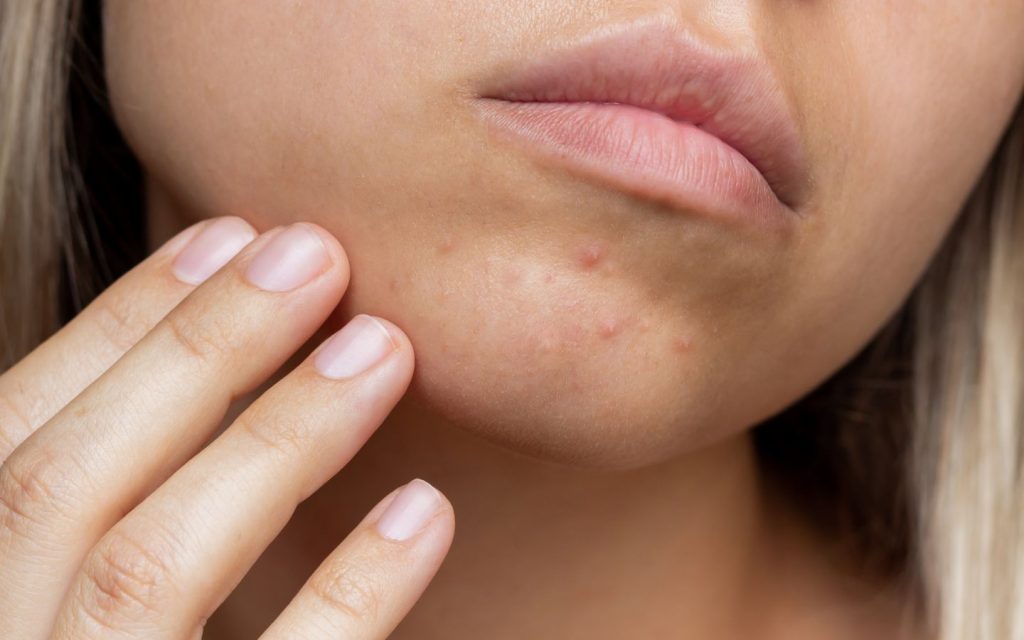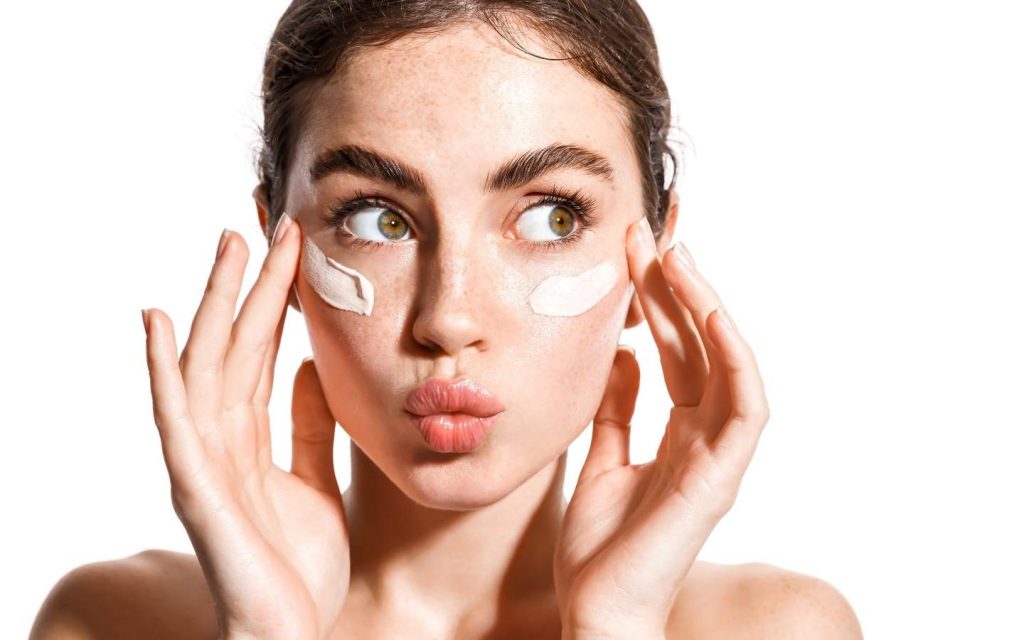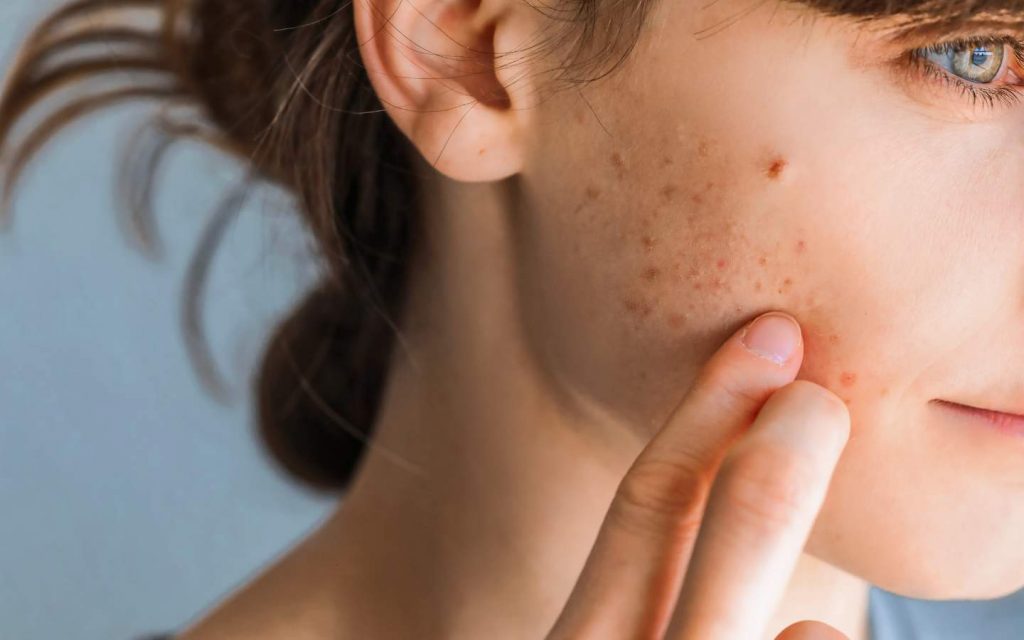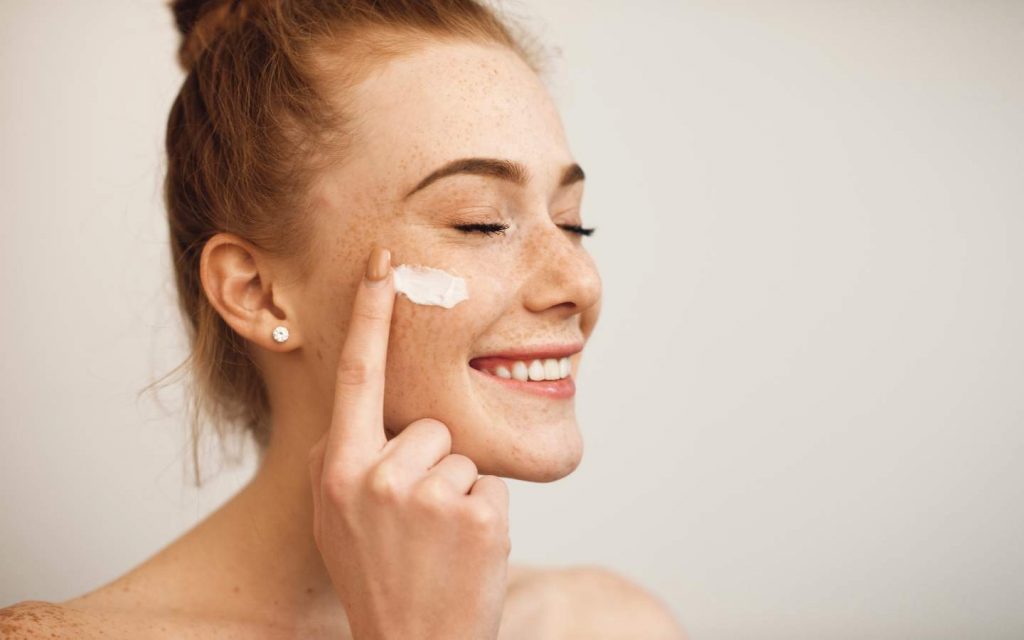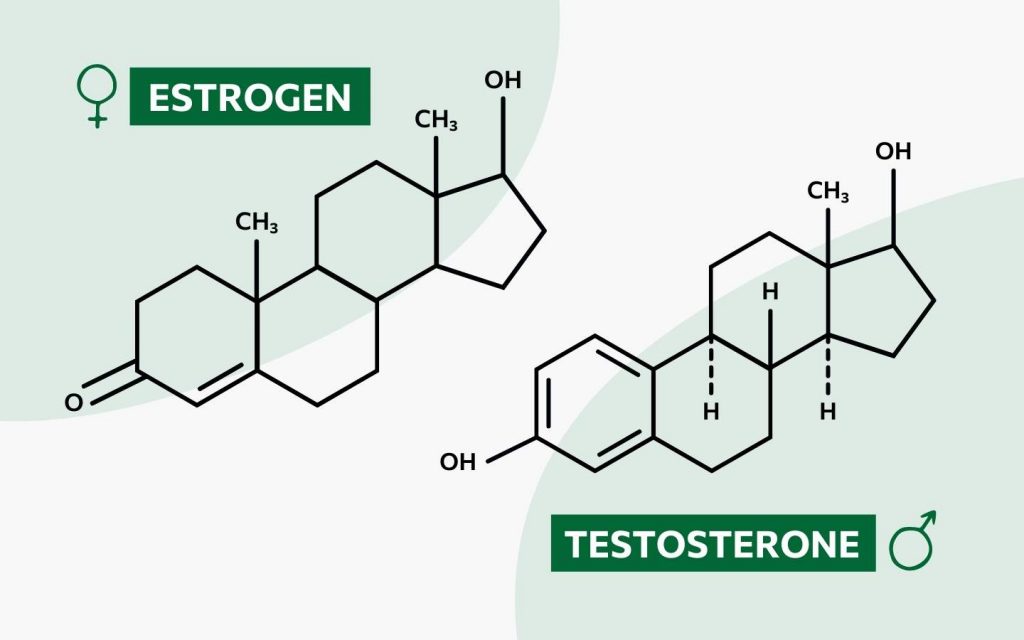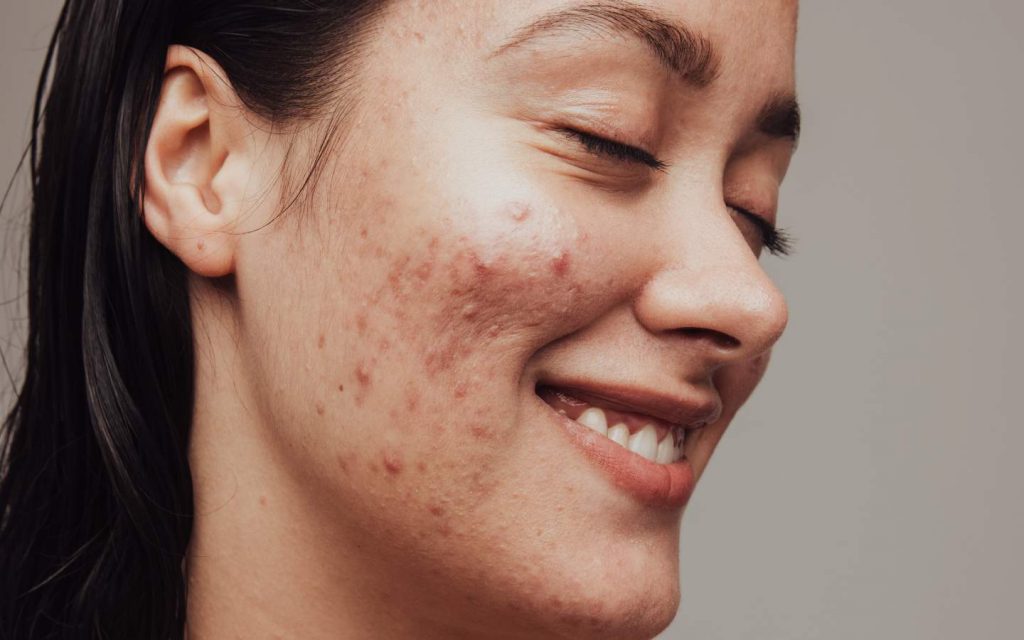


This article has been reviewed by:
Alexandra Beck
Cosmetician
Besides hormonal fluctuations, stress, nicotine and the wrong skin care, a wrong diet can be a significant reason for blemished skin. The basic prerequisite for healthy and beautiful skin is a varied diet. This includes sufficient proteins, complex carbohydrates, healthy fats and a variety of micro- and macronutrients.
In the following article you will learn more about foods that can be responsible for blemished skin as well as foods including nutrients that are particularly good for the skin.
If you want to learn about other reasons that can lead to blemished skin, please click here.
What kind of food can be responsible for blemished skin?
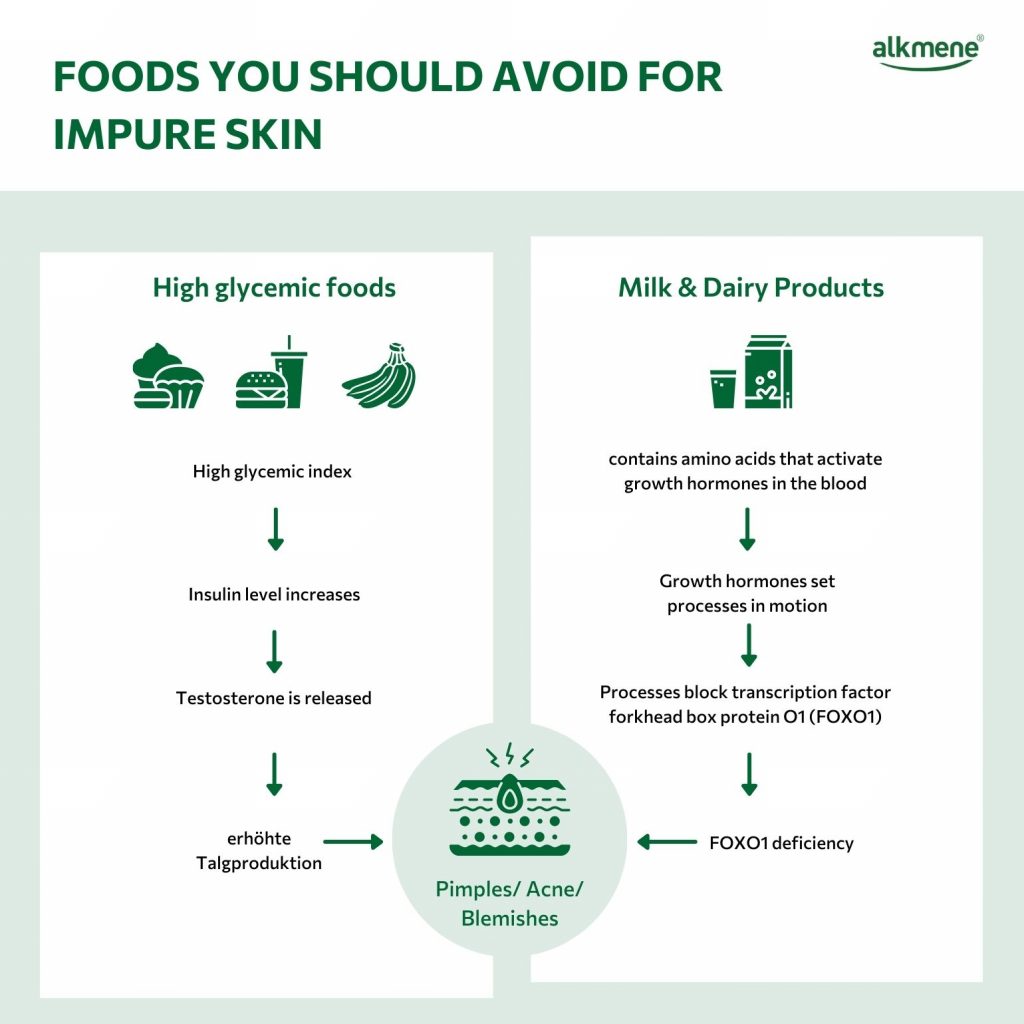

The glycemic index shows how much the blood glucose level rises after eating certain foods. If the food has a high glycemic index, the insulin level in the body increases rapidly. The high insulin level results in the release of the androgen testosterone. Testosterone promotes an overproduction of sebum and thus clogs the pores. This leads to blemished skin such as blackheads and pimples.
(If you want to learn more about androgens, anti-androgens and their connection to blemished skin, check out this post).
Foods that are high-glycemic:
- White sugar and sugary foods
- White bread
- Potatoes, corn, white rice
- Bananas, grapes
- Beer, soft drinks
- Milk chocolate

20% of Germans have a milk intolerance (lactose intolerance). If milk and dairy products continue to be consumed despite the lactose intolerance, the intestine is stressed in the long term. This stress on the intestine can have a negative effect on the skin.
But as studies have shown, it is not only lactose intolerance that leads to blemished skin when milk is consumed. Milk contains amino acids that activate growth hormones in the blood – such as insulin – mTor and IGF-1. These growth hormones initiate processes in the body that block the transcription factor Forkhead Box Protein O1 (FOXO1). Thus, a deficiency of FOXO1 occurs. When FOXO1 is no longer present, acne or skin blemishes develop. This phenomenon has been known in dermatology for a long time.
If you want to avoid cow’s milk, there are a number of plant-based milks available. For example, you can use oat or soy milk for coffee and rice or almond milk for cereal.
The right diet for blemished skin: Which foods and nutrients promote an improvement in the skin's appearance?
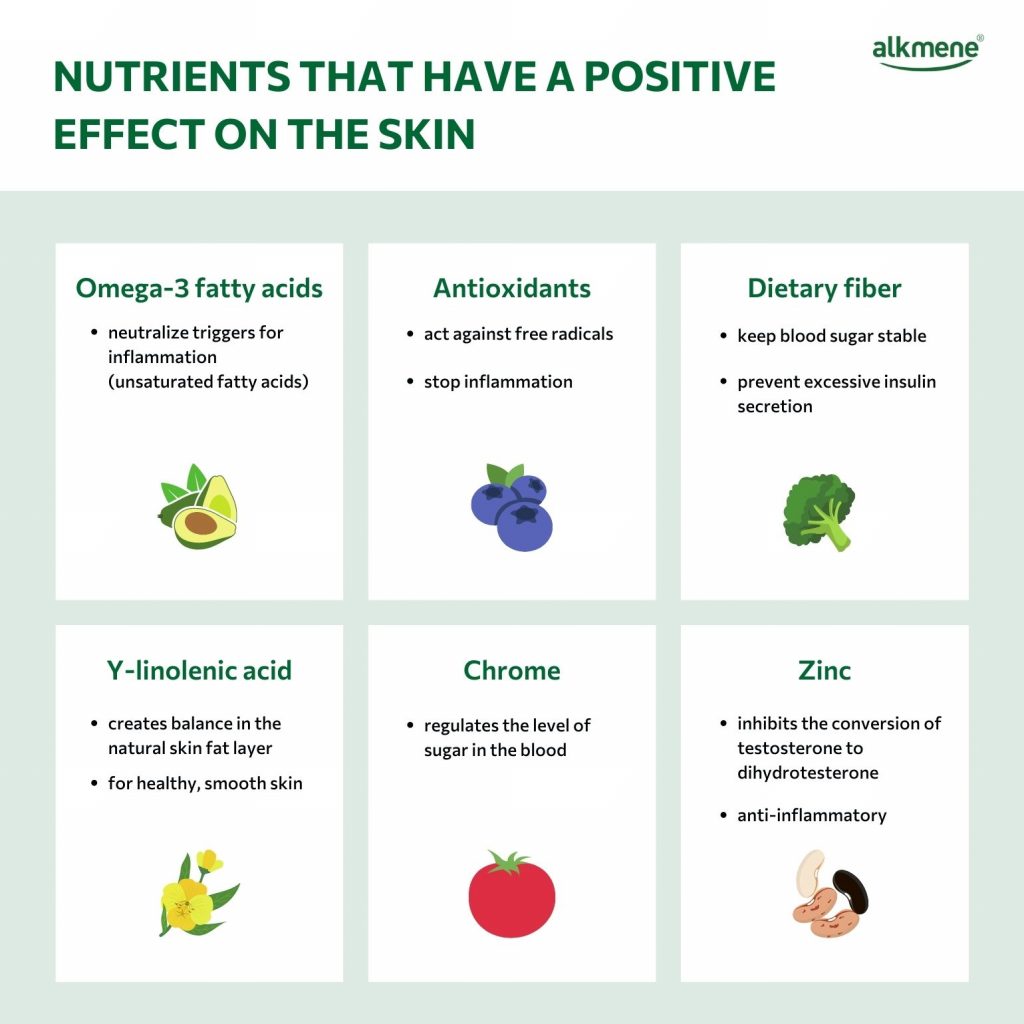

Dietary fibers are vegetable fibers and swelling agents. They keep blood sugar levels stable and thus prevent too much insulin from being released. This in turn has positive effects on the skin. Fiber is therefore an essential ingredient for the right diet for blemished skin.
Foods high in fiber:
- Legumes (soybeans, beans, lentils, chickpeas).
- Whole grain products (whole grain pasta, whole grain bread).
- Green vegetables (cabbage, broccoli, fennel), carrots
- Dried fruits (prunes, raisins, dates)

Behaviors such as smoking, alcohol consumption and poor diet result in oxidative stress. This creates free radicals that promote inflammation and thus contribute to blemished skin and pimples. This is where antioxidants come into play. They can work against the harmful free radicals and stop inflammation in the body. Antioxidants are flavonoids, carotenoids, selenium, vitamin A, vitamin C and vitamin E. In principle, almost every fruit and vegetable contains a composition of antioxidants, but there are some that have a particularly high concentration.
These foods contain flavonoids:
- Eggplants
- Blueberries
These foods contain vitamin C:
- Black currants
- Rose hips
- Broccoli
- Bell peppers
Diese Lebensmittel enthalten Vitamin E:
- Vegetable oil
- Nuts, seeds, kernels
Other strong anti-inflammatory foods:
- Garlic and onions
- Ginger and turmeric

Pimples are known to be caused by clogged pores, resulting from excessive sebum production. Vitamin A can be used to counteract the production of sebum. Since vitamin A is toxic in high doses, you should talk to your family doctor about the right dosage. Vitamin A (also called retinol) is only found in animal foods. If you eat a vegetarian or vegan diet, retinol can be replaced by its precursor, beta-carotene. Vitamin A can only be released by zinc. Therefore, it is important not to have a zinc deficiency in case of blemished skin.
Foods that contain retinol:
- Liver
- Butter
Foods that contain beta-carotene:
- Carrots
- Sweet potato
- Kale
- Spinach
- Apricots

Zinc has an anti-inflammatory effect on our skin. In addition, zinc inhibits the enzyme that converts testosterone into dihydrotesterone (DHT). Thus, sebum production is reduced and pimples can be counteracted.
Foods that contain zinc:
- Liver
- Lentils
- Yellow peas
- White beans
- Garlic
- Nuts
- Salmon
- Mushrooms

Omega-3 fatty acids are unsaturated fats that are good for the body and therefore important for a complete supply of the skin and for our immune system. Only when the immune system works properly can inflammation and pimples be avoided. Omega 3 fatty acids can neutralize unsaturated fatty acids and thus stop the triggers for inflammation.
Foods that contain omega 3:
- Salmon
- Mackerel
- Sardines
- Eggs
- Linseed oil
- Avocado
- Walnuts
- Chia seeds
- Hemp seed
Y-linolenic acid belongs to the omega-6 fatty acids. It creates a balance in the natural skin lipid layer and thus ensures healthy, smooth skin. The best source of this omega-6 fatty acid is evening primrose oil.

Chromium helps regulate sugar levels in the blood by increasing the effectiveness of insulin. If the blood sugar level is too high, the body secretes more androgens (such as testosterone). This, in turn, can lead to pimples by increasing sebum production.
These foods contain chromium:
- Brewer’s yeast
- Cocoa powder
- Tomatoes, peppers, onions
- Lentils
- Brazil nuts
- Eggs
- Grapes
![]()
